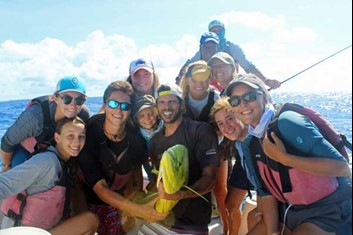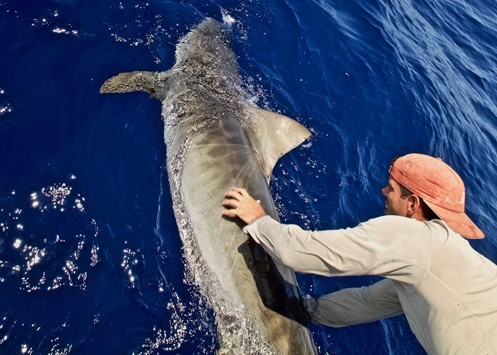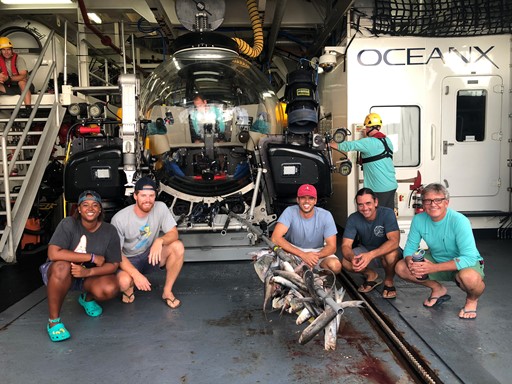
When asked if he had any advice for current and prospective students pursuing marine biological sciences at FSU, he exclaimed, "Get to know the folks at the marine lab! All of them are amazing. I am a big fan of each and every one of them."
 Brendan received his BS in Biology from Furman University, his Master's in Biology from Florida State University, and then his Ph.D. from Florida International University. His Master's research, under the guidance of Dr. Dean Grubbs, focused on the post-release mortality of deep-sea bycatch species - predicting how often animals caught by accident suffer mortality when they are thrown back alive.
Brendan received his BS in Biology from Furman University, his Master's in Biology from Florida State University, and then his Ph.D. from Florida International University. His Master's research, under the guidance of Dr. Dean Grubbs, focused on the post-release mortality of deep-sea bycatch species - predicting how often animals caught by accident suffer mortality when they are thrown back alive.
After earning his Master's degree, Brendan headed to Washington D.C. to work in the Marine Mammal Commission as a part of his NOAA Sea Grant Knauss Fellowship. Following his fellowship, he landed at the Cape Eleuthera Institute as a Research Associate. Brendan is now a Postdoctoral Scholar at Scripps Institution of Oceanography & The Nature Conservancy.
Growing up in Kentucky, Brendan's interest in marine biology developed through years of fishing in the bluegrass state's various creeks as well as fishing the seagrass beds near Pensacola Beach in the summers when he visited his mom. As he learned more about the threats facing our oceans, he became more passionate about ocean conservation.
As a Research Associate at Cape Eleuthera Institute (CEI), Brendan spent a lot of his time doing research and using his findings to teach CEI students. His research was quite varied, with elements of deep-sea exploration and shark ecology being the most common elements of his ongoing projects.
What motivates him the most is the belief that answering certain questions can lead directly to the improved management of marine resources. He believes this can be done through educating the next generation at The Island School, where he taught a semester-long Applied Research course twice a year, or at Deep Creek Middle School, where kids from Eleuthera spend a few weeks each semester at CEI exploring their backyard ocean. He also helped teach visiting programs from around the world. What Brendan enjoyed most about teaching is CEI's hands-on learning approach. The staff rarely give lectures -- instead, they incorporate the students into field tasks such as setting up and hauling longlines, working up sharks, and rotating them through the different roles of a research team. According to Brendan, "This process feeds the more direct route to improved resource management - publishing our findings, communicating our work inside and outside of The Bahamas, and delivering our results to managers themselves."

"The Bahamas is an amazing place to work because I can spend the morning sampling reef sharks in 20 feet of water and the afternoon focusing on deepwater invertebrates or deep-diving whales in 1000 m and still make it back home in time for dinner. You don't find that kind of access to so many different species and ecosystems in many parts of the world." -- Brendan Talwar
 Brendan (center, red hat) next to (l-r) Dr. Dean Grubbs and Dr. Gavin Naylor
Brendan (center, red hat) next to (l-r) Dr. Dean Grubbs and Dr. Gavin Naylor
"I have been very fortunate to have many fantastic graduate students in my lab and Brendan was a model student during his time at FSUCML. He developed his Master’s thesis project independently, successfully won grants and scholarships to fund a majority of the research and, importantly, published all of his work. Brendan went on to win a highly-prestigious Knauss Fellowship through NOAA which gave him a lot of experience in the marine policy realm. He now leads a productive shark research program at the Cape Eleuthera Institute while conducting research for his PhD through Florida International University. Brendan and I continue to work together to this day and I am proud to call him a colleague and a friend." - Dr. Dean Grubbs
Brendan was a part of OceanX's historic tagging of a sixgill shark by submarine. (Click here for the story!) He has been fortunate to be on a number of missions with OceanX and has loved each and every one. They had a great team of scientists, engineers, chefs, deckhands, and many others who made each mission a success. For Brendan, the whole process was an incredible learning experience. He started out helping with the initial research proposals and eventually ran the logistics for a number of the missions, set science priorities, and assembled the teams. It was his first experience running a research expedition with so many different aspects and he is so thankful for his supervisor at CEI (Dr. Edd Brooks) for trusting him with it. He was also thrilled to work with many FSUCML researchers on the various trips (such as Dr. Grubbs and Dr. Sandra Brooks).
"My favorite (deep-sea) sub dive was actually one that I did with Travis Richards (another alum of FSUCML) to tag a bluntnose sixgill. We had a big shark cruising around the sub, but the tagging guns didn't fire when we pulled the trigger. It was still an incredible experience to be in a sub that was shaking thanks to a bluntnose sixgill that was feeding off of it."
Brendan's Ph.D research focused on answering a handful of questions about the silky shark, a species that has experienced significant population declines in the western Atlantic in recent decades. He hopes to characterize their vertical and horizontal movements (figure out where they are going and why), investigate changes in habitat use and feeding ecology across their life history, and develop tools for ecosystem-based fisheries management that can answer questions about how silky sharks will respond to changes in sargassum (brown macroalgae) abundance as a result of climate change.
To keep up-to-date on Brendan's work, click here.

When asked if he had any advice for current and prospective students pursuing marine biological sciences at FSU, he exclaimed, "Get to know the folks at the marine lab! All of them are amazing. I am a big fan of each and every one of them."